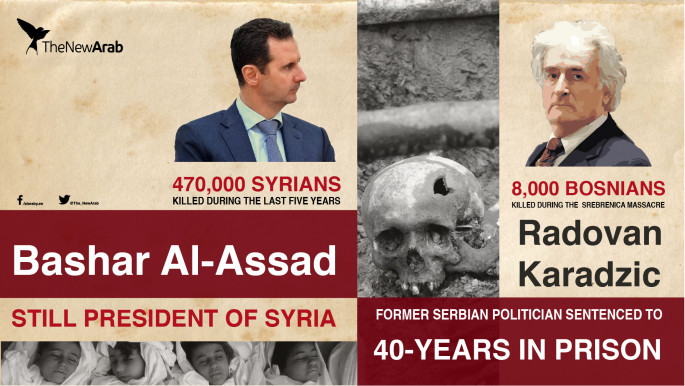
Prisoners beyond the sun: Saving Syria's detainees
Hundreds of thousands of Syrians, including women and innocent people, are still languishing in Assad’s prisons, but an activist-run campaign is working hard to put their issue on the agenda.
5 min read
Save the Rest have published testimonies from Syrian regime prisons where torture is systematic [AFP]
"It started as a campaign to try to save the rest of the people who survived so far in Assad’s prisons" said Susan, an activist working with Save the Rest campaign, a grassroots organisation working to save the lives of thousands if not hundreds of thousands still languishing in Assad’s prisons.
The issue of Syrian prisoners was brought to the world's attention when a defected Syrian officer "Cesar" fled the country with 50,000 graphic photos of detainees who were tortured to death.
Despite what many viewed as irrefutable evidence of a "Syrian holocaust," Syria's prison population has continued to increase, as the world appears to remain in denial.
"We are a group of people - human rights activists, lawyers and detainees working to speak out loud working to save people who are still alive, because every single minute we are losing people," said Susan.
The campaign began as Syrian activists leaked letters and diaries from prisoners, at great risk to both the campaigners and the prisoners' lives.
"When you read diaries of those prisoners, you know that whenever the clock ticks [a] spirit slips out of our hands. You can see through those diaries how they suffer, how they are tortured, how they share olives among themselves," said Susan.
"Many were detained for no reason, they weren’t even political prisoners. They were taken by mistake," she added.
 |
The campaign began as Syrian activists leaked letters and diaries from prisoners, at great risk to both the campaigners and the prisoners' lives |  |
"In the hell of intelligence services, I witnessed the death of many detainees. Sa’ad was the first disconnected detainee - one whose brain stops giving voluntary orders to his body, disconnecting him from the surroundings. He doesn’t eat or talk..." read one letter.
"There are many disconnected people around, but how long they last varies, though never surviving more than one month".
In another letter, a detainee discusses living life in underground cells, never seeing the sunlight.
 |
| Click to enlarge |
"Many see the sun again, but only as lifeless bodies wrapped in shrouds. I bade Ahmad farewell after his severe asthma attack when the ventilation stopped working," wrote the prisoner.
"We carried Abu Muham outside the cell and laid his body, which couldn’t endure the disease in the corridor. My little friend Samer was too thin; I carried him out of the cell on my own."
Another detainee described detention as a way to kill without the 'PR' of killing on the street.
"I have become a number, a negligible number. My death is no loss as Assad can arrest a dozen for each detainee with no one to stop him," the prisoner wrote.
The group created a video cartoon with a flower character symbolizing a prisoner being tortured in numerous horrific ways.
|
|
||
"No one can imagine that such things are going on in this earth in 2016," said Susan. "When we are talking about detainees we are talking about enforced disappearances, or someone calling their families saying you can take their bodies," she said.
The organisation also published a testimony from a mother whose son was killed during detention.
"I don’t know how often memories rolled before his eyes," she wrote. "I don’t know how many times he begged for his life so he could come back to my arms."
The Save the Rest campaign works on two levels - attempting to pressure at international level, and also urging the Syrian opposition to separate humanitarian detainee cases from political demands.
"The regime is trying to use detainees as a weapon, even detainees who were due to be released and are completely innocent, especially women, [who] are kept in prison for exchanges," said Susan.
Women detainees are often used to pressure male members of the family.
 |
The Save the Rest campaign puts pressure at international level, and also urges the opposition to separate humanitarian detainee cases from political demands |  |
"If you miss a member of your family - sometimes if you report the person is missing you put their life at risk. They ask about their sons and they get no answer," said Susan.
International organisations provide limited support as their access to the prisons is extremely limited.
"They are not able to support, they can’t see the reality," said Susan.
"The medical situation is so bad, but no one is allowed to take medication to them, but the organisations. they know when the red crescent is visiting because there will be a clean-up," she added.
"Nothing can convey the reality - you can’t imagine how they can survive or lead a normal life afterwards - they were lucky to survive but how they could survive?"
While hundreds of thousands of human beings remain in underground prisons, unable to even sit down due to their conditions, the issue of prisoners arguably remains marginal, even in the Syria conflict.
"Whenever you see the sun, just remember that there are people living beyond it," wrote a detainee.





 Follow the Middle East's top stories in English at The New Arab on Google News
Follow the Middle East's top stories in English at The New Arab on Google News


